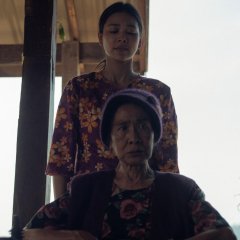- Português (Portugal)
- Français
- English
- Deutsch
- Título original: วิมานหนาม
- Também conhecido como: The D Project , โปรเจกต์ดี
- Roteirista e Diretor: Boss Naruebet Kuno
- Roteirista: Kate Karakade Norasethaporn, Junior Naron Cherdsoongnern
- Gêneros: Thriller, Drama
Elenco e Créditos
- Jeff SaturThongkam KhanlongsukPapel Principal
- Engfa WarahaMo JongyoiPapel Principal
- Seeda PuapimonSaengPapel Principal
- Keng Harit BuayoiJingna JongyoiPapel Principal
- Toey Pongsakorn Mettarikanon"Sek" Seksan BoonkhamluePapel Secundário
- Babymild Pratchayanan Suwanmanee[Thongkam's friend]Convidado
Resenhas
Must watch film!
"The Paradise of Thorns" is a powerful depiction of Thai society's deep-seated issues, with a particular focus on marriage inequality. The film excels in its storytelling, blending intense drama with cultural commentary. The acting is superb, bringing the characters' struggles and emotions to life in a way that feels both genuine and compelling. Coupled with some of the best cinematography in recent Thai cinema, the film creates a visually stunning yet thought-provoking experience. The film's original soundtrack beautifully complements the emotional depth of the story, enhancing the overall impact of the narrative. It's an exceptional piece of filmmaking that resonates on multiple levels, making it the best Thai film for me.Esta resenha foi útil para você?
Fruits of Sorrow: Love's Tangled Roots in 'Paradise of Thorns
In the lush embrace of a remote durian orchard, "The Paradise of Thorns" unfolds like a bittersweet fruit, its story as complex and layered as the Thai landscape it inhabits. This poignant Thai film weaves a tapestry of love, loss, and legal strife, centering on Thongkam and Sek, a gay couple whose shared life is abruptly severed by tragedy.As the fragrant durian blossoms wither, so too does Thongkam's world when Sek passes away. The orchard, once a sanctuary of their love, becomes a battleground of grief and ownership. Thongkam must navigate the thorny path of reclaiming what he believes is rightfully his, while the absence of legal recognition for their union casts a long shadow over his fight.
The film's brilliance lies in its nuanced portrayal of five key characters, each a prism refracting different hues of love and loss:
Thongkam, portrayed with raw emotion by Jeff Satur, stands as the heart of the story. His endurance in the face of hardship is as steadfast as the durian trees he tends, his love for Sek rooted deeply in the soil of their shared dreams.
Mo, brought to life by Engfa Waraha, initially appears as thorny as the durian's husk. Yet, as the layers peel away, we see a woman equally scarred by love's cruel hand, her devotion to Saeng a testament to love's many forms.
Sek, played with complexity by Toey Pongsakorn Mettarikanon, embodies the conflict between desire and duty. Like a durian split open, his character reveals the sweet and the bitter - a man torn between his true self and societal expectations.
Saeng, masterfully portrayed by Seeda Puapimon, is like the roots of the durian trees - hidden yet vital. Her journey from seeming selfishness to revealed vulnerability mirrors the ripening of the fruit itself, her love emerging too late, but no less potent.
Jingna, brought to life by Keng Harit Buayoi, serves as the film's conscience. Like a bird's-eye view of the orchard, he sees all, his perspective offering a bittersweet wisdom on the cost of blind pursuit.
"Paradise of Thorns" transcends its initial premise of LGBTQ rights, blossoming into a universal meditation on love's many facets. It reminds us that in our struggle to claim what we believe we deserve, we may lose sight of what truly matters.
Set against the rustic beauty of Mae Hong Son, the film whispers that these tales of love and loss are as universal as the seasons. From Bangkok's bustling streets to the quiet durian groves of the north, human hearts beat to the same rhythm of joy and sorrow.
In the end, "Paradise of Thorns" leaves us with a profound truth: sometimes, in life's orchard, we open what we believe to be the sweetest fruit, only to find bitterness within. Yet it's in accepting this duality that we truly taste the richness of the human experience.
Esta resenha foi útil para você?































![[BL/gay/LGBTQ+] movies & short movies](https://i.mydramalist.com/kmL7O_4t.jpg)
![[BL/gay/LGBTQ+] movies & short movies](https://i.mydramalist.com/eVm48t.jpg)
![[BL/gay/LGBTQ+] movies & short movies](https://i.mydramalist.com/gZZ0Ot.jpg)
![[BL/gay/LGBTQ+] movies & short movies](https://i.mydramalist.com/7r3YBt.jpg)
![[BL/gay/LGBTQ+] movies & short movies](https://i.mydramalist.com/kDBwv_4t.jpg)
















